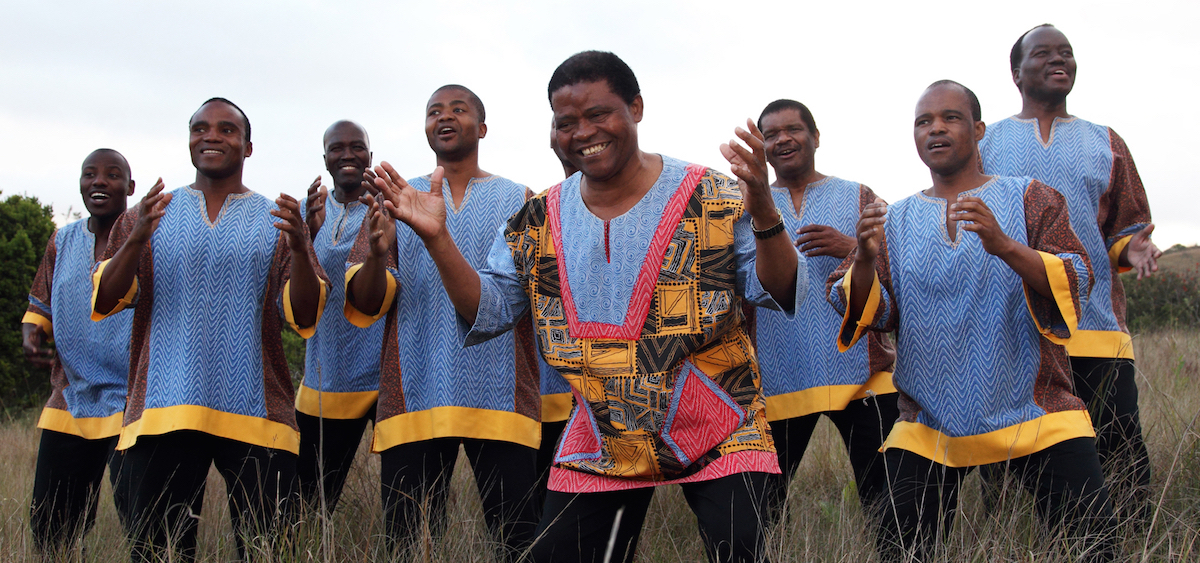Culture

Ladysmith Black Mambazo Tour To Stop In Nelsonville
< < Back to ladysmith-black-mambazo-tour-stop-nelsonvilleGrammy-winning South African music legends Ladysmith Black Mambazo will make a stop in Nelsonville this Friday, Feb. 13 for a show at Stuart’s Opera House.
Last year the South African a cappella group was awarded their fourth Grammy Award for the album Singing For Peace Around The World. They have returned to the U.S. for a 35-date celebration of South African culture and history.
A radio broadcast in 1970 opened the door to Ladysmith Black Mambazo’s first record contract–the beginning of an ambitious discography that currently includes more than 50 recordings, 15 Grammy Award nominations and four Grammy Award statues. The group has been also nominated for several Academy and Tony Awards.
The group was founded in the early 1960s by Joseph Shabalala, then a young farm boy-turned-factory worker. Ladysmith is the name of Joseph’s hometown, a small farming area between Durban and Johannesburg; Black being a reference to the oxen, the strongest of all farm animals; and Mambazo, the Zulu word for chopping axe, a symbol of the group’s ability to “chop down” any singing rival who might challenge them.
They won so many awards that, by the end of the 1960s, they were banned from competitions, although they were welcome to participate as entertainers. A radio broadcast in 1970 opened the door to their first record contract. Since then, their recording philosophy has been as much about preservation of musical heritage as it has been about entertainment.
Apartheid, the South African social system forced upon the country’s black majority to keep the white minority government in power, was a dividing force in many ways. The musicians and artists of South Africa took two paths of resistance. Some sang songs with powerful messages of revolution against the horrors of apartheid. Others, like Ladysmith Black Mambazo, followed a path of peaceful protest.
Joseph Shabalala, following the ways of protest that Martin Luther King. Jr. used in the U.S, wrote songs of hope and a better tomorrow. When Nelson Mandela was released from prison in 1990, he named Ladysmith Black Mambazo’s singing as one of the powerful messages of peace he listened to while in jail. In fact, when Mandela was awarded the Nobel Peace Prize in 1993, he brought Ladysmith Black Mambazo with him to Oslo, Norway to receive his award.
The group performs a traditional music called isicathamiya (is-cot-a-ME-Ya), which developed in the mines of South Africa where black workers were taken by rail to work far away from their homes and their families. Poorly housed and paid, the mine workers would entertain themselves after a six-day week by singing songs into the wee hours on Sunday morning. When the miners returned to the homelands, this musical tradition returned with them.
During the 1970s Ladysmith Black Mambazo established themselves as the most successful singing group in South Africa. In the mid-1980s, Paul Simon visited South Africa and incorporated the group’s rich tenor/alto/bass harmonies into his famous Graceland album – a landmark recording that was considered seminal in introducing world music to mainstream audiences.
In addition to their work with Paul Simon, Ladysmith Black Mambazo has recorded with numerous artists, including Stevie Wonder, Dolly Parton, Sarah McLachlan, Josh Groban, Emmylou Harris, Melissa Etheridge and many others. They have provided film soundtrack singing for Disney’s The Lion King, Part II as well as Eddie Murphy’s Coming To America, Marlon Brando’s A Dry White Season, James Earl Jones’ Cry The Beloved Country and Clint Eastwood’s Invictus.
A 2000 documentary titled On Tip Toe: Gentle Steps to Freedom, the Story of Ladysmith Black Mambazo was nominated for an Academy Award. They have also appeared on Broadway where they were nominated for a Tony Award
Friday’s show time is 7:30pm. Floor seats are $30 in advance or $35 at the door, balcony seats are $25 in advance or $30 at the door, and box seats are $40 in advance or $45 at the door. Visit www.stuartsoperahouse.org for more information.

